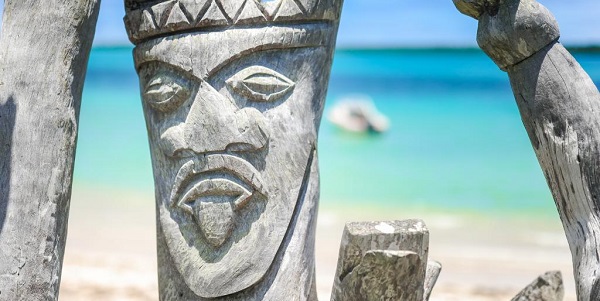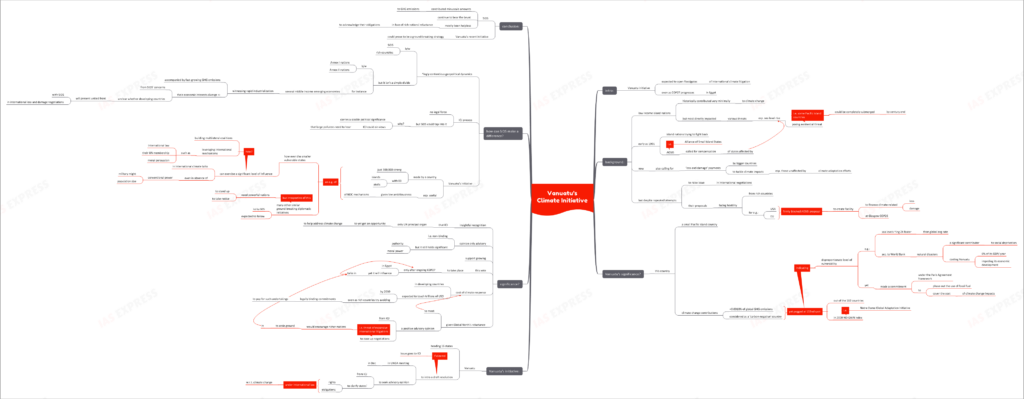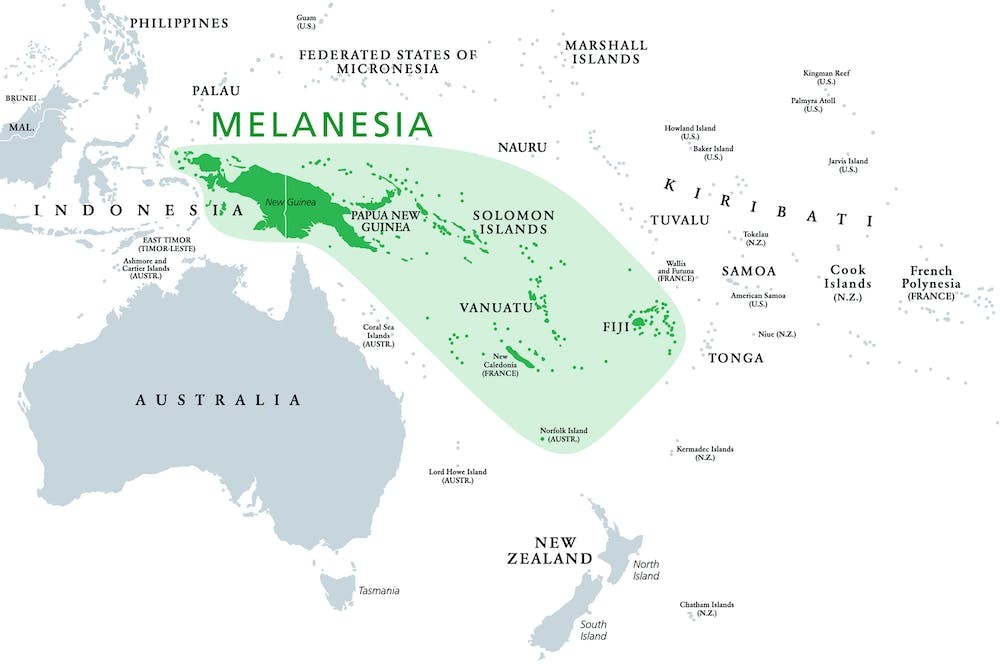Vanuatu’s Climate Initiative- How SIDS Can Make a Difference

In light of the ongoing COP27 climate talks, small island nations, facing disproportionately devastating climate change fallouts, are losing patience with the much larger polluting countries. If the talks in Egypt don’t see any significant development, a key vote at the next UNGA meeting, started by Vanuatu, is expected to open the floodgates of international climate litigation.

Background:
- Low income island nations have historically contributed very minimally to climate change. Yet they are the most directly impacted by it.
- Of the various threats, rising sea levels pose an immediate existential threat to these nations’ low lying atolls. It is expected that some Pacific island countries would be completely submerged by the end of this century.
- As early as 1991, the island nations have been trying to fight back. For instance, the AOSIS or Alliance of Small Island States called for compensation of states affected by rising sea levels.
- Today, these countries are calling for ‘loss and damage’ payments by the bigger countries to tackle the climate change-related impacts, especially those that can’t be addressed via climate adaptation efforts.
- However, despite the repeated attempts to raise the issue in international negotiations, their proposals are facing hostility from the rich nations. For instance, the USA and the EU firmly blocked the AOSIS proposal to create a facility to finance the climate-related loss and damage, at the Glasgow COP26.
Why is Vanuatu significant in the climate debate?

- Vanuatu is a small Pacific island country that contributes less than 0.0018% of the global GHG emissions. It is even considered as a ‘carbon-negative’ country.
- Yet, it is pegged at the 132nd spot out of the 182 countries assessed by the 2020 ND-GAIN (Notre Dame Global Adaptation Initiative) Index. This shows its disproportionate level of vulnerability to climate change impacts.
- The country’s sea levels are rising twice as fast as the global rate. The levels are expected to rise through the century.
- The World Bank noted that natural disasters are a significant contributor to social deprivation in the country. These disasters are costing Vanuatu some 6% of its GDP/ year, thus impeding its economic development.
- Despite these vulnerabilities, the country has made a commitment, under the Paris Agreement framework, to phase out the use of fossil fuel in its economy and to cover the cost of climate change impacts.
What is Vanuatu doing now?
- The country, at the head of a group of 16 states, is to introduce a draft resolution, in the December UNGA meeting, seeking an advisory opinion, from the ICJ, regarding the states’ rights and obligations under international law with respect to climate change.
- If this initiative gains sufficient support, the issue would be taken to the International Court of Justice.
Why is this significant?
- The Vanuatu President has made an insightful recognition that the ICJ is the only principal UN organ that is yet to be “given an opportunity to help address the climate crisis”.
- If taken to the ICJ, the court’s opinion would only be advisory in nature i.e. non-binding. However, the opinion would hold significant legal authority and moral power.
- The support for the initiative has been growing.
- Though this vote is to take place after the ongoing COP27, the initiative would still have a sizable influence on the talks in Sharm el Sheikh.
- The cost of climate response in developing countries is expected to touch trillions of USD by 2050, even as the rich countries try avoiding legally binding commitments to pay for such undertakings.
- Given the Global North’s reluctance to meet these costs, a positive advisory opinion from the ICJ would help ease up the negotiations. The threat of expansive international litigations would encourage the richer nations to cede ground in the talks.
How can SIDS make a difference?
- This also plays into the increasingly contentious geopolitics dynamics between the smaller developing island nations and the richer nations.
- However, this isn’t a simple divide between the ‘Annex I’ and ‘non-Annex I’ countries. For instance, several middle income emerging economies are witnessing rapid industrialization, accompanied by fast-growing GHG emissions. Hence, their economic interests diverge from the concerns of the small island states. It is unclear whether these developing countries will present a united front along with the small island nations in the international loss and damage negotiations.
- While the ICJ process has no legal force, the small island developing states could tap into it for it carries a sizable political significance. If given the opportunity, the ICJ would air views that the large polluters need to hear.
- This initiative stems from the low level of ambitiousness in the NDC (nationally determined contributions) system. Many states are actively undermining these obligations through their lack of transformative climate action.
- The recent initiative is being undertaken by a small country, merely 300,000 strong and with some 83 islands and atolls. This is an example of how even the smaller vulnerable states can exercise a significant level of influence in international climate talks. Even in the absence of conventional power i.e. military might and population size, smaller states can acquire power by building multilateral coalitions and by leveraging international mechanisms such as the international law, their UN membership and even moral persuasion.
- It is expected that many other similar ground-breaking diplomatic initiatives, led by SIDS, will follow Vanuatu’s efforts.
- However, irrespective of the initiative’s outcome, the effort will have meaningful results only when the countries redress them. Powerful nations must take notice and stand up.
Conclusion:
SIDS have contributed minuscule amounts to the global GHG emission loads. Yet, they continue to bear the brunt of the climate change fallouts. They have mostly been helpless in the face of the richer nations’ reluctance to acknowledge their obligations in climate talks. However, Vanuatu’s recent initiative could prove to be a ground-breaking strategy for the SIDS.
Practice Question for Mains:
Discuss the significance of Vanuatu taking the climate change issue to the ICJ. What can small island nations do to make a difference in climate talks? (250 words)
If you like this post, please share your feedback in the comments section below so that we will upload more posts like this.

